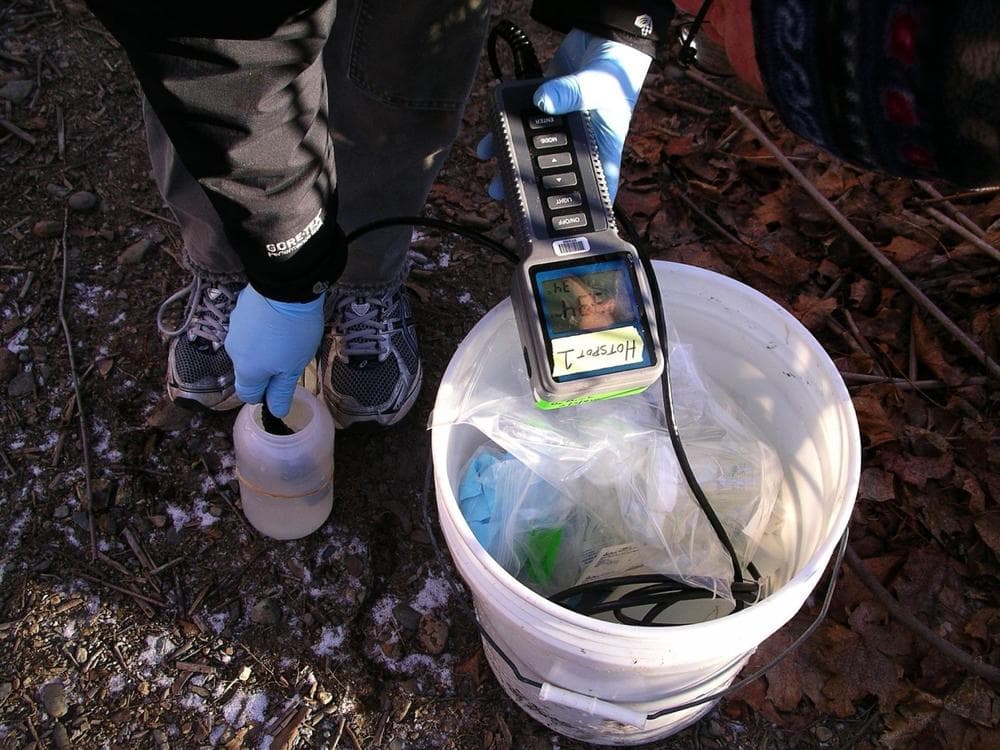Advertisement
Boston Environmentalists Face Upstream Battle In Big Oil Settlement
Resume
Wearing dark green waders and sloshing into a stream, Patrick Herron, a scientist from the Mystic River Watershed Association, collects monthly water samples from several sites along the Chelsea Creek and its tributaries.
In a concrete culvert in Chelsea, he scouts for sources of pollution, and while the lab results won’t be in for a few weeks, troubling signs are all around.
Along the muddy creeks from East Boston to Chelsea, there are tires, rusted paint cans and an old television set. But even as a fuel barge pushed by a tugboat heads downriver, Herron sees the potential.
"I think if you invest in the environment around the community, it really reverberates with how people think about their environment and ultimately their own health," Herron says.
John Walkey is one such person in the community. The East Boston resident is part of the Chelsea Creek Action Group, whose mission is to wedge some nature in with the smokestacks around here. For years they have had their sights on an eight-acre brownfield along the creek, which they want to transform into an oasis of wetlands and salt marsh.
"You normally don’t do wetlands restoration where there are tugboats and tankers going right past you and where there’s a huge residential community with a lot of people right there," Walkey says.
But suddenly there is an opportunity to do just that, thanks to a $4.6 million settlement federal lawyers negotiated last year with Exxon-Mobil after a tanker dumped 15,000 gallons of diesel fuel in the river in 2006. The judge even stipulated that the money should ideally be spent on improving the environment in the towns most affected by the spill.
[soundslide]http://www.wbur.org/files/soundslides/2010/wbur_0222_pollution-settlement[/soundslide]
Environmentalists such as Ekongar Singh Khalsa, who directs the Mystic River Watershed Association, are pinning their hopes on that money.
"This is a golden opportunity," Singh Khalsa says. "This is free money, $4.6 million awaiting someone to step forward and spend it in the Mystic River area. This site on Chelsea Creek is perfect."
But there is one serious hitch. The money was funneled into a federal program known as the North American Wetlands Conservation Act (NAWCA). It is aimed not at urban settings but at preserving huge, thousand-acre swaths of wetlands for migratory birds.
Critics question the decision to park all that money in such a tough-to-tap fund. Even the grant’s coordinator, Mitch Hartley, from the United States Fish and Wildlife Service, feels the tension as East Boston butts up against the steep requirements of NAWCA.
"Layer on top of that the fact that people for a long time have been dealing with having all this industry and pollution right in their backyard," Hartley says. "It makes it more compelling to do it locally. But then you have to square that with the idea that, what's this particular pot of money. These things are in such acute conflict."
The grant is not the only obstacle. The brownfield is owned by the Boston Redevelopment Authority, which has shown little interest in loosening its grip on the land. And there is a stack of regulatory hurdles — all of which favor the status quo over the group’s environmental vision.
It doesn't take long to see how the fuel industry dominates this waterway: On a recent Tuesday, the Meridian Street bridge opened and closed eight times in less than two hours, while motorists waited and massive tankers glided in and out of the Chelsea Creek.
Juan Morales is one of the youth members of the Chelsea Creek Action Group, the 18-year-old high school senior yearns for something other than fuel tankers and trucks in his neighborhood.
"Being raised in East Boston, there has always been industry around," Morales says. "A wetland would create a green space, a place where it’s beautiful. You could see like nature, like right there."
Activists like Morales have their work cut out for them. The last chance to apply for the grant money is July. And their bid for a slice of nature along this busy shipping channel offers the only hope that the communities affected by the oil spill will see one dime of the $4.6 million settlement.
This program aired on February 22, 2010.